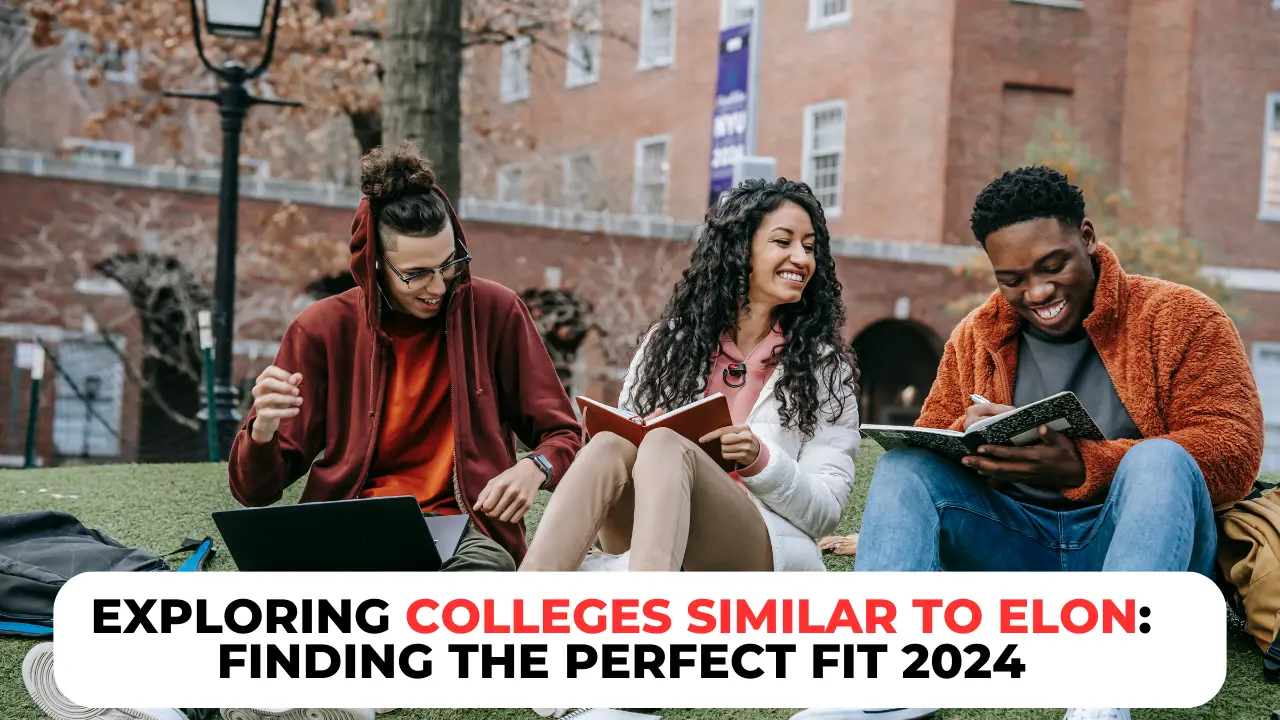The journey to find the ideal college is a significant milestone in every student’s life. It’s a quest for an institution that not only imparts knowledge but also molds character, fosters growth, and provides a vibrant community to thrive in. As you embark on this path, one name that might have caught your attention is Elon University, known for its unique blend of academic excellence, experiential learning, and a tight-knit community.
However, finding a college that perfectly aligns with your goals, values, and aspirations is a deeply personal process. While Elon may be the dream institution for some, others might be seeking colleges that share similar characteristics but offer their distinct advantages. This is where the concept of “college fit” comes into play.
In this comprehensive guide, we’ll explore the idea of “college fit” and the vital factors that influence your college search. We’ll delve into the nitty-gritty of what makes a college similar to Elon, and how you can identify these institutions. Whether you’re drawn to Elon’s small class sizes, engaging professors, or the vibrant campus community, this guide will help you uncover colleges that echo those traits.
So, let’s embark on this enlightening journey to discover the colleges that align with your dreams, values, and academic pursuits, ensuring that your college years become a truly transformative experience.
Understanding Elon University
Elon University is a private university in Elon, North Carolina. It has an undergraduate population of about 7,000 students. Elon is known for its strong academics, beautiful campus, and vibrant student life.
Elon is unique in several ways. First, it has a strong emphasis on experiential learning. Elon students are encouraged to participate in internships, service learning, and study abroad programs. This gives them the opportunity to gain real-world experience and apply their knowledge in the classroom.
Second, Elon has a focus on global citizenship. Elon students are encouraged to learn about different cultures and perspectives. The university offers a variety of programs and resources to help students develop their global citizenship skills.
Third, Elon has a commitment to sustainability. The university has implemented a number of initiatives to reduce its environmental impact. Elon is also a leader in sustainable education. The university offers a variety of courses and programs that focus on sustainability.
Finally, Elon has a strong sense of community. Elon students are encouraged to get involved in campus life and to support each other. The university has a variety of clubs and organizations that students can join. Elon also has a strong tradition of service learning and volunteerism.
Here are some of the unique characteristics of Elon University:
- Experiential Learning: Elon is known for its strong emphasis on experiential learning. Elon students are encouraged to participate in internships, service learning, and study abroad programs. This gives them the opportunity to gain real-world experience and apply their knowledge in the classroom.
- Global Citizenship: Elon has a focus on global citizenship. Elon students are encouraged to learn about different cultures and perspectives. The university offers a variety of programs and resources to help students develop their global citizenship skills.
- Sustainability: Elon has a commitment to sustainability. The university has implemented a number of initiatives to reduce its environmental impact. Elon is also a leader in sustainable education. The university offers a variety of courses and programs that focus on sustainability.
- Sense of Community: Elon has a strong sense of community. Elon students are encouraged to get involved in campus life and to support each other. The university has a variety of clubs and organizations that students can join. Elon also has a strong tradition of service learning and volunteerism.
Elon University is a unique and vibrant institution that offers its students a well-rounded education. If you are looking for a university that will challenge you academically, encourage you to get involved in your community, and help you become a global citizen, then Elon University is the place for you.
The Concept of College Fit
What is college fit?
College fit is the degree to which a college is a good match for your academic, social, and personal needs. It’s important to find a college that’s a good fit for you because it can make a big difference in your success and happiness in college.
Why is finding the right fit crucial?
Finding the right college fit is crucial for a number of reasons. First, it can affect your academic success. If you’re in a college that’s too challenging or too easy for you, you’re less likely to succeed. Second, your college fit can affect your social and emotional well-being. If you’re in a college where you don’t feel comfortable or supported, you’re more likely to experience stress and anxiety. Third, your college fit can affect your career success. If you’re in a college that doesn’t have the programs and resources you need to prepare for your chosen career, you’ll be at a disadvantage when you graduate.
How to find the right college fit
There are a number of things you can do to find the right college fit for you. First, think about your academic goals. What do you want to study in college? What kind of academic environment do you thrive in? Second, think about your social and personal needs. Do you want to go to a large or small school? Do you want to be in a rural or urban setting? What kind of extracurricular activities are important to you? Third, think about your financial situation. How much can you afford to pay for college?
Once you’ve considered these factors, you can start to narrow down your list of college choices. Visit colleges that you’re interested in and talk to current students and faculty. This will give you a better sense of the school’s culture and whether it’s a good fit for you.
Tips for finding the right college fit
Here are a few tips for finding the right college fit:
- Be honest with yourself about your academic and personal needs.
- Visit colleges that you’re interested in and talk to current students and faculty.
- Don’t be afraid to ask questions.
- Consider your financial situation.
- Trust your gut instinct.
Finding the right college fit is one of the most important decisions you’ll make in your life. Take your time and do your research to find the school that’s the best match for you.
Determining Your Preferences
Personal values and priorities
What are your personal values and priorities? What is important to you in a college experience? Do you want to attend a school with a strong academic reputation? Do you want to go to a school with a diverse student body? Do you want to be involved in extracurricular activities? Do you want to be close to home?
Academic and extracurricular interests
What are your academic and extracurricular interests? What do you want to study in college? What kind of extracurricular activities are important to you? Do you want to be involved in research? Do you want to be involved in student government? Do you want to be involved in athletics?
Geographical location considerations
Where do you want to go to college? Do you want to stay close to home? Do you want to go to school in a big city? Do you want to go to school in a small town? Do you want to go to school near a beach? Do you want to go to school near the mountains?
Budget and financial factors
How much can you afford to pay for college? What kind of financial aid are you eligible for? Do you want to go to a public or private school? Do you want to go to an in-state or out-of-state school?
Once you have a good understanding of your personal values, priorities, academic interests, extracurricular interests, geographical location considerations, and budget, you can start to narrow down your list of college choices.
Here are some questions you can ask yourself to help you determine your preferences:
- What kind of academic environment do I thrive in?
- What kind of social environment do I thrive in?
- What kind of extracurricular activities are important to me?
- What kind of geographical location do I want to live in?
- How much money can I afford to spend on college?
Answering these questions will help you to better understand your preferences and to find a college that is a good fit for you.
Identifying Key Factors
When choosing a college, there are many factors to consider. Some of the most important key factors include:
- Size and student body demographics: Do you want to attend a large university with a diverse student body, or a small college with a more homogeneous student body?
- Campus culture and atmosphere: Do you want to attend a college with a vibrant social scene, or a college with a more laid-back atmosphere?
- Academic programs and majors: Does the college offer the academic programs and majors you are interested in?
- Faculty-student ratio: Do you want to attend a college with a low faculty-student ratio, so that you can have more interaction with your professors?
- Extracurricular opportunities: Does the college offer the extracurricular activities that are important to you?
- Career services and internships: Does the college have a strong career services department that can help you find internships and jobs after graduation?
In addition to these key factors, you may also want to consider the following:
- Location: Do you want to attend a college in a rural area, a suburban area, or an urban area?
- Cost: How much can you afford to pay for college?
- Financial aid: What kind of financial aid is available to you?
- Athletic programs: Do you want to attend a college with a strong athletic program?
- Religious affiliation: Do you want to attend a college with a religious affiliation?
It is important to weigh all of these factors when making your decision. There is no one-size-fits-all answer to the question of how to choose a college. The best college for you is the one that best meets your individual needs and preferences.
Here are some questions you can ask yourself to help you identify the key factors that are important to you:
- What kind of learning environment do I thrive in?
- What kind of social environment do I thrive in?
- What are my academic goals?
- What are my career goals?
- What kind of extracurricular activities are important to me?
- How much money can I afford to spend on college?
Answering these questions will help you to better understand the key factors that are important to you and to find a college that is a good fit for you.
Researching Colleges
Researching colleges is an important step in the college admissions process. By doing your research, you can learn about different schools and find the best fit for your academic, social, and personal needs.
Here are some tips for researching colleges:
- Utilize college search tools. There are a number of college search tools available online, such as the College Board and the U.S. Department of Education’s College Navigator. These tools can help you find colleges that meet your specific criteria, such as location, size, and cost.
- Visit college websites. College websites are a great source of information about each school’s academic programs, extracurricular activities, and campus life. Be sure to read through each website carefully and take note of the information that is most important to you.
- Read student reviews. Student reviews can give you a valuable insights into the college experience at each school. You can find student reviews on websites such as Cappex and Niche.
- Gather information from college fairs and visits. College fairs and visits are a great way to learn about different schools and to talk to current students and faculty. When you are attending a college fair or visit, be prepared to ask questions about the school’s academic programs, extracurricular activities, and campus life.
Here are some specific questions you can ask yourself when researching colleges:
- What are my academic goals?
- What are my career goals?
- What kind of learning environment do I thrive in?
- What kind of social environment do I thrive in?
- What are my extracurricular interests?
- How much money can I afford to spend on college?
- What kind of financial aid is available to me?
By answering these questions and conducting thorough research, you can find the college that is the best fit for you.
Here are some additional tips for researching colleges:
- Start early. The earlier you start researching colleges, the more time you will have to visit schools, talk to current students and faculty, and compare different options.
- Be organized. Keep track of the information you gather about each school. This will help you to compare and contrast different schools and to make informed decisions.
- Be realistic. Consider your academic and financial needs when you are researching colleges. Don’t apply to schools that you are unlikely to be admitted to or that you cannot afford.
- Get help from others. Talk to your parents, teachers, and guidance counselors about the college selection process. They can offer you valuable advice and support.
Choosing a college is an important decision, but it doesn’t have to be overwhelming. By following these tips, you can conduct thorough research and find the college that is the best fit for you.
Colleges with Similar Characteristics
Subheading 1: Emphasizing the importance of variety
There is no one-size-fits-all answer to the question of which college is the right fit for you. This is because each student has their own unique needs and preferences. That’s why it’s important to explore a variety of colleges before making a decision.
By exploring different types of colleges, you can learn more about your own preferences and what you’re looking for in a college experience. You may find that you’re interested in a large university with a diverse student body, or a small college with a more intimate community. You may also find that you’re interested in a college with a strong focus on academics, or a college with a more well-rounded curriculum.
The important thing is to find a college that is a good fit for you, both academically and socially. By exploring a variety of colleges, you can increase your chances of finding the right fit.
Subheading 2: Exploring different types of colleges
There are many different types of colleges to choose from, each with its own unique advantages and disadvantages. Some of the most common types of colleges include:
- Public universities: Public universities are funded by the state government and typically offer lower tuition rates than private colleges. Public universities also tend to have larger student bodies and more diverse student populations.
- Private universities: Private universities are funded by private donations and typically offer higher tuition rates than public universities. Private universities also tend to have smaller student bodies and less diverse student populations.
- Liberal arts colleges: Liberal arts colleges focus on providing a well-rounded education in the arts and sciences. Liberal arts colleges typically have smaller student bodies and a more intimate community.
- Community colleges: Community colleges offer two-year degrees and typically have lower tuition rates than four-year colleges. Community colleges are a good option for students who want to save money on their education or who are not sure what they want to study.
Subheading 3: Elon-like features to look for
If you’re looking for a college with similar features to Elon, you may want to consider the following:
- Size and student body demographics: Elon has a moderate-sized student body of about 7,000 students. The student body is relatively diverse, with students from all over the world.
- Campus culture and atmosphere: Elon has a vibrant campus culture with a variety of extracurricular activities and social events. The campus is also known for its beautiful scenery and well-maintained facilities.
- Academic programs and majors: Elon offers a variety of undergraduate and graduate academic programs. The university is known for its strong academics and its commitment to experiential learning.
- Faculty-student ratio: Elon has a low faculty-student ratio of about 11:1. This means that students have more opportunities to interact with their professors and to get personalized attention.
- Extracurricular opportunities: Elon offers a variety of extracurricular activities, including student government, clubs and organizations, and intramural sports. The university also has a strong athletic program with Division I teams in several sports.
- Career services and internships: Elon has a strong career services department that helps students find internships and jobs after graduation. The university also offers a variety of resources to help students prepare for their careers, such as resume writing workshops and mock interviews.
In addition to these features, you may also want to consider the location of the college, the cost of tuition, and the availability of financial aid. By considering all of these factors, you can find the college that is the best fit for you.
Here are some additional tips for finding a college with similar features to Elon:
- Look for colleges with a similar size and student body demographics.
- Look for colleges with a vibrant campus culture and a variety of extracurricular activities.
- Look for colleges with a strong academic reputation and a commitment to experiential learning.
- Look for colleges with a low faculty-student ratio.
- Look for colleges with a strong career services department.
By following these tips, you can increase your chances of finding a college with similar features to Elon.
Public vs. Private Institutions
Public and private institutions each have their own advantages and disadvantages. Here is a brief overview:
Public Institutions
Advantages:
- Lower tuition rates than private institutions
- Larger student bodies and more diverse student populations
- More likely to offer need-based financial aid
Disadvantages:
- Larger class sizes
- Fewer resources per student
- Less personalized attention from professors
Examples of public institutions similar to Elon:
- University of North Carolina at Chapel Hill
- University of Virginia
- William & Mary
- University of California, Los Angeles
- University of Michigan
Private Institutions
Advantages:
- Smaller class sizes
- More resources per student
- More personalized attention from professors
- More likely to offer a variety of extracurricular activities and social events
Disadvantages:
- Higher tuition rates than public institutions
- Smaller student bodies and less diverse student populations
- Less likely to offer need-based financial aid
Examples of private institutions similar to Elon:
- Wake Forest University
- Davidson College
- Furman University
- Wofford College
- Centre College
Ultimately, the best way to decide whether to attend a public or private institution is to weigh the advantages and disadvantages of each type of institution and to choose the one that is the best fit for you academically, socially, and financially.
Please note that this is just a small sample of public and private institutions similar to Elon. There are many other great schools out there, and it is important to do your research to find the best fit for you.
Liberal Arts Colleges
A liberal arts education is a broad-based education that focuses on the arts, sciences, and humanities. It is designed to help students develop critical thinking, communication, and problem-solving skills. Liberal arts colleges typically have smaller student bodies than universities, and they offer a more personalized educational experience.
Here are some of the characteristics of liberal arts colleges:
- Strong academics: Liberal arts colleges are known for their strong academics. They typically have high admissions standards and rigorous academic programs.
- Focus on experiential learning: Liberal arts colleges often emphasize experiential learning, such as internships, study abroad, and service learning.
- Small class size: Liberal arts colleges typically have small class sizes, which allows for more interaction between students and professors.
- Diverse student body: Liberal arts colleges typically have diverse student bodies, with students from all over the world.
- Vibrant campus culture: Liberal arts colleges typically have vibrant campus cultures with a variety of extracurricular activities and social events.
Here are some specific liberal arts colleges similar to Elon:
- Davidson College: Davidson College is a private liberal arts college located in Davidson, North Carolina. It has a student body of about 1,900 students. Davidson is known for its strong academics, its commitment to experiential learning, and its vibrant campus culture.
- Colby College: Colby College is a private liberal arts college located in Waterville, Maine. It has a student body of about 1,800 students. Colby is known for its strong academics, its beautiful campus, and its commitment to social justice.
- Bowdoin College: Bowdoin College is a private liberal arts college located in Brunswick, Maine. It has a student body of about 1,800 students. Bowdoin is known for its strong academics, its commitment to experiential learning, and its beautiful campus.
- Middlebury College: Middlebury College is a private liberal arts college located in Middlebury, Vermont. It has a student body of about 2,500 students. Middlebury is known for its strong academics, its commitment to experiential learning, and its beautiful campus.
- Williams College: Williams College is a private liberal arts college located in Williamstown, Massachusetts. It has a student body of about 2,000 students. Williams is known for its strong academics, its commitment to experiential learning, and its beautiful campus.
- Amherst College: Amherst College is a private liberal arts college located in Amherst, Massachusetts. It has a student body of about 1,800 students. Amherst is known for its strong academics, its commitment to experiential learning, and its beautiful campus.
These are just a few of the many great liberal arts colleges that are similar to Elon. When choosing a liberal arts college, it is important to consider your academic interests, your extracurricular interests, and your financial needs. You should also visit the colleges that you are interested in to get a feel for the campus culture and to talk to current students and faculty.
Ultimately, the best way to find the right liberal arts college for you is to do your research and to visit the schools that you are interested in. With so many great options to choose from, you are sure to find the perfect liberal arts college for you.
Research Universities
Research universities are institutions of higher education that are focused on research and scholarly activity. They typically have large student bodies and offer a wide range of academic programs. Research universities are also known for their strong faculty and their state-of-the-art facilities.
Here are some of the characteristics of research universities:
- Strong academics: Research universities are known for their strong academics. They typically have high admissions standards and rigorous academic programs.
- Emphasis on research: Research universities emphasize research and scholarly activity. They typically have large research budgets and faculty who are actively involved in research.
- State-of-the-art facilities: Research universities typically have state-of-the-art facilities, including libraries, laboratories, and research centers.
- Diverse student body: Research universities typically have diverse student bodies, with students from all over the world.
- Vibrant campus culture: Research universities typically have vibrant campus cultures with a variety of extracurricular activities and social events.
Here are some research universities similar to Elon:
- University of North Carolina at Chapel Hill The University of North Carolina at Chapel Hill is a public research university located in Chapel Hill, North Carolina. It has a student body of about 30,000 students. UNC Chapel Hill is known for its strong academics, its commitment to research, and its vibrant campus culture.
- University of Virginia The University of Virginia is a public research university located in Charlottesville, Virginia. It has a student body of about 21,000 students. UVA is known for its strong academics, its commitment to research, and its beautiful campus.
- Georgia Institute of Technology The Georgia Institute of Technology is a public research university located in Atlanta, Georgia. It has a student body of about 40,000 students. Georgia Tech is known for its strong academics, its commitment to research, and its focus on STEM education.
- Wake Forest University Wake Forest University is a private research university located in Winston-Salem, North Carolina. It has a student body of about 8,000 students. Wake Forest is known for its strong academics, its commitment to research, and its beautiful campus.
- Northeastern University Northeastern University is a private research university located in Boston, Massachusetts. It has a student body of about 27,000 students. Northeastern is known for its strong academics, its commitment to research, and its focus on experiential learning.
Small vs. Large Colleges
Small colleges
Pros:
- Smaller class sizes
- More personalized attention from professors
- Stronger sense of community
- More opportunities to get involved in campus life
Cons:
- Fewer resources and facilities
- Less diversity in the student body
- Fewer academic and extracurricular options
Large colleges
Pros:
- More resources and facilities
- More diversity in the student body
- More academic and extracurricular options
- More opportunities to meet new people
Cons:
- Larger class sizes
- Less personalized attention from professors
- Weaker sense of community
- It can be harder to get involved in campus life
Elon-like options in both categories:
Small colleges
- Davidson College
- Colby College
- Bowdoin College
- Middlebury College
- Williams College
- Amherst College
- Pomona College
- Claremont McKenna College
- Carleton College
- Harvey Mudd College
- Swarthmore College
Large colleges
- University of North Carolina at Chapel Hill
- University of Virginia
- Georgia Institute of Technology
- Wake Forest University
- Northeastern University
- University of Michigan
- University of California, Los Angeles
- Ohio State University
- University of Texas at Austin
- Pennsylvania State University
- University of Washington
Ultimately, the best way to decide whether to attend a small or large college is to weigh the pros and cons of each type of institution and to choose the one that is the best fit for you academically, socially, and financially.
It is also important to visit the colleges that you are interested in to get a feel for the campus culture and to talk to current students and faculty. This will give you a better sense of whether the school is a good fit for you.
With so many great options to choose from, you are sure to find the perfect college for you.
Scholarships and Financial Aid
Importance of financial planning
Paying for college can be a daunting task, but it is important to start planning early. By understanding the different financial aid options available and taking steps to reduce your costs, you can make college more affordable.
Here are some tips for financial planning for college:
- Start early: The earlier you start planning, the more time you will have to save money and research financial aid options.
- Estimate your costs: Get an estimate of the total cost of attendance, including tuition, fees, room and board, and books and supplies.
- Research financial aid options: There are a variety of financial aid options available, including grants, scholarships, loans, and work-study.
- Apply for financial aid: Be sure to complete the Free Application for Federal Student Aid (FAFSA) as soon as possible after October 1st.
- Reduce your costs: There are a number of ways to reduce your college costs, such as taking community college courses, living off campus, and working part-time.
Scholarships and aid opportunities
There are a variety of scholarships and aid opportunities available to help students pay for college. Here are some examples:
- Federal Pell Grants: Pell Grants are need-based grants that do not have to be repaid.
- Federal Supplemental Educational Opportunity Grants (FSEOGs): FSEOGs are need-based grants that are awarded to students with the greatest financial need.
- Federal Perkins Loans: Perkins Loans are low-interest loans that are awarded to students with the greatest financial need.
- Federal Work-Study: Work-study allows students to earn money to help pay for college expenses.
- State and local grants: Many states and localities offer grants to students who meet certain criteria, such as academic achievement or financial need.
- Private scholarships: There are thousands of private scholarships available to students. Some scholarships are based on academic merit, while others are based on financial need or other factors.
To find out more about scholarships and aid opportunities, you can visit the following websites:
- Federal Student Aid: https://studentaid.gov/
- College Board: https://www.collegeboard.org/
- Fastweb: https://www.fastweb.it/
- Scholarships.com: https://www.scholarships.com/
By planning early and researching financial aid options, you can make college more affordable and achieve your educational goals.
Campus Visits and Interviews
The role of campus visits in decision-making
Campus visits and interviews are important tools for students and parents to get a feel for a college and its community. They are also a great way to learn more about the college’s academic programs, admissions process, and financial aid options.
Here are some reasons why campus visits are important:
- Campus visits allow you to experience the college’s atmosphere. You can walk around the campus, talk to current students and faculty, and attend classes and events. This will give you a sense of whether the college is a good fit for you.
- Campus visits allow you to ask questions and get more information about the college. You can talk to admissions officers, financial aid counselors, and current students to learn more about the college’s programs, policies, and culture.
- Campus visits show the college that you are interested. Admissions officers appreciate students who take the time to visit the campus. This shows that you are serious about attending the college and that you have done your research.
Preparing for interviews and meetings with admissions staff
If you have an interview scheduled with an admissions officer, there are a few things you can do to prepare:
- Research the college. Learn as much as you can about the college’s academic programs, admissions process, and financial aid options. This will help you to answer questions and ask informed questions of your own.
- Dress professionally. First impressions matter, so make sure to dress professionally for your interview.
- Arrive on time. Punctuality shows that you are serious about the interview and that you respect the admissions officer’s time.
- Be prepared to answer common questions. Admissions officers typically ask common questions about your academic background, extracurricular activities, and future goals. Be prepared to answer these questions thoughtfully and honestly.
- Ask questions. This is your opportunity to learn more about the college and to see if it is a good fit for you. Don’t be afraid to ask questions about the college’s programs, policies, and culture.
Campus visits and interviews can be a valuable part of the college admissions process. By taking the time to visit campuses and meet with admissions officers, you can learn more about the colleges you are interested in and make informed decisions about where to apply.
Application Process
Common application requirements
The common application is a standardized application that is used by over 900 colleges and universities in the United States. The common application requires students to submit the following information:
- Personal information: This includes your name, address, date of birth, and contact information.
- Academic information: This includes your high school transcript, standardized test scores, and any other relevant academic information.
- Extracurricular activities: This includes a list of your extracurricular activities, such as sports, clubs, and volunteer work.
- Awards and honors: This includes a list of any awards or honors that you have received.
- Essays: The common application requires students to write two essays. The first essay is a personal statement, in which you can write about anything you want. The second essay is a supplemental essay, which is specific to the college or university to which you are applying.
Tips for a strong college application
Here are some tips for writing a strong college application:
- Start early. Don’t wait until the last minute to start working on your application. Give yourself plenty of time to gather your materials, write your essays, and proofread your application carefully.
- Be honest and authentic. In your personal statement and supplemental essays, be honest and authentic about yourself. Write about your experiences, your thoughts, and your goals.
- Proofread carefully. Before you submit your application, be sure to proofread it carefully for any errors in grammar or spelling. You may also want to ask a friend or family member to proofread your application for you.
Here are some additional tips for putting together a strong college application:
- Tailor your application to each school. Take the time to learn about each school you are applying to and to tailor your application to each school. This shows the admissions officers that you are serious about attending their school.
- Get letters of recommendation from strong writers. Ask teachers, coaches, or other mentors to write letters of recommendation for you. Choose people who know you well and who can write positive and insightful letters about you.
- Submit your application on time. Be sure to submit your application on time or by the early decision deadline, if applicable. This shows the admissions officers that you are serious about attending their school.
By following these tips, you can write a strong college application that will increase your chances of getting accepted to the schools of your choice.
Making Your Final Decision
Weighing pros and cons
When it comes time to make your final decision about which college to attend, it is important to weigh the pros and cons of each school. Consider the following factors:
- Academics: Is the school’s academic program strong in your area of interest? Do the professors have a good reputation?
- Campus life: Do you like the school’s campus culture? Are there extracurricular activities that you are interested in?
- Cost: Is the school affordable? What kind of financial aid is available?
- Location: Do you like the school’s location? Is it close to home?
- Size: Do you want to attend a small college or a large university?
Consulting with mentors and family
Once you have weighed the pros and cons of each school, it is a good idea to talk to mentors and family members to get their advice. They can offer you their own perspectives and help you to make a decision that is right for you.
Trusting your instincts
Ultimately, the decision of which college to attend is a personal one. You need to trust your instincts and choose the school that you feel best about.
Here are some additional tips for making your final decision:
- Visit the schools again. If possible, visit the schools again before you make your decision. This will give you another chance to experience the campus and to talk to current students and faculty.
- Talk to other students. Talk to other students who have been accepted to the schools that you are considering. They can give you their insights into the schools and help you to make a decision.
- Meditate on your decision. Take some time to meditate on your decision and to think about what is important to you in a college. This will help you to make a decision that is right for you.
Choosing a college is a big decision, but it doesn’t have to be overwhelming. By following these tips, you can make a well-informed decision that will set you up for success in the future.
Conclusion
Recap the importance of finding the right college fit
Finding the right college fit is important for a number of reasons. First, it can help you to succeed academically. When you are surrounded by students and faculty who share your interests and values, you are more likely to be motivated and engaged in your studies.
Second, finding the right college fit can help you to develop personally and socially. College is a time to explore your interests, meet new people, and develop your own identity. When you are at a college that is the right fit for you, you are more likely to have a positive and rewarding experience.
Third, finding the right college fit can help you to prepare for your future career. Many colleges offer internships and other experiential learning opportunities that can help you to gain valuable skills and experience. When you are at a college that is the right fit for you, you are more likely to graduate with the skills and knowledge you need to succeed in your chosen career.
Encouraging students to embark on their college search journey
The college search process can be daunting, but it is also an exciting time. It is a time to explore your options and to find the college that is the best fit for you.
Here are some tips for students who are embarking on their college search journey:
- Start early. The earlier you start your college search, the more time you will have to visit schools, research financial aid options, and prepare your application.
- Be open-minded. Consider a variety of schools, both large and small, public and private.
- Do your research. Visit schools, talk to current students and faculty, and read online reviews.
- Be realistic. Consider your academic and financial needs when you are choosing schools.
- Ask for help. Talk to your parents, teachers, and guidance counselors for advice.
The college search process can be challenging, but it is also an important opportunity to find the school that is the best fit for you. By following these tips, you can increase your chances of finding the college where you will thrive.
Additional Resources
Here are some additional resources that you may find helpful in your college search:
Websites:
- [College Board] https://www.collegeboard.org/
- [College Navigator] https://nces.ed.gov/collegenavigator/
- [Cappex] https://www.appily.com/
- [Niche] https://www.niche.com/
- [Unigo] https://www.unigo.com/
- [Peterson’s] https://www.petersons.com/
Books:
- The Best 387 Colleges, 2023 Edition, by The Princeton Review
- Colleges That Change Lives, 5th Edition, by Loren Pope
- Where You Go Is Not Who You’ll Be, by Frank Bruni
- The Gatekeepers, by Jacques Steinberg
- Paying for College Without Going Broke, 2023 Edition, by Kalman Chany with Geoff Martz
Other tools:
- [College Scorecard] https://collegescorecard.ed.gov/
- [CollegeXpress] https://www.collegexpress.com/
- [BigFuture] https://bigfuture.collegeboard.org/
- [Campus Pride Index] https://www.campusprideindex.org/
Seeking professional advice:
You may also want to seek professional advice from a college counselor or admissions consultant. These professionals can help you with all aspects of the college search process, from choosing schools to writing essays to preparing for interviews.
Here are some tips for seeking professional advice:
- Get recommendations from friends, family, or teachers.
- Interview several professionals before making a decision.
- Make sure that the professional is a good fit for you and your needs.
The college search process can be daunting, but it doesn’t have to be overwhelming. By using these resources and seeking professional advice when needed, you can increase your chances of finding the college that is the best fit for you.
Frequently Asked Questions (FAQs)
What is the definition of “college fit”?
College fit is a term used to describe how well a college aligns with a student’s academic, social, and financial needs. When a student finds a college that is a good fit, they are more likely to be successful and satisfied with their college experience.
How do I identify my preferences and priorities?
One way to identify your preferences and priorities is to think about what is important to you in a college experience. Consider factors such as academic programs, campus life, location, cost, and size. You can also talk to friends, family, and teachers to get their input.
Another way to identify your preferences and priorities is to take a college fit assessment. These assessments can help you to identify your academic strengths and interests, as well as your social and personal needs.
What are the most critical factors to consider when looking for colleges similar to Elon?
When looking for colleges similar to Elon, you should consider the following factors:
- Size and student body demographics: Elon has a moderate-sized student body of about 7,000 students. The student body is relatively diverse, with students from all over the world.
- Campus culture and atmosphere: Elon has a vibrant campus culture with a variety of extracurricular activities and social events. The campus is also known for its beautiful scenery and well-maintained facilities.
- Academic programs and majors: Elon offers a variety of undergraduate and graduate academic programs. The university is known for its strong academics and its commitment to experiential learning.
- Faculty-student ratio: Elon has a low faculty-student ratio of about 11:1. This means that students have more opportunities to interact with their professors and to get personalized attention.
- Extracurricular opportunities: Elon offers a variety of extracurricular activities, including student government, clubs and organizations, and intramural sports. The university also has a strong athletic program with Division I teams in several sports.
- Career services and internships: Elon has a strong career services department that helps students find internships and jobs after graduation. The university also offers a variety of resources to help students prepare for their careers, such as resume writing workshops and mock interviews.
What tools can I use to research potential colleges?
There are a number of tools that you can use to research potential colleges. Some of these tools include:
- College websites: College websites are a great place to start your research. You can learn about the college’s academic programs, campus life, and financial aid options.
- College search engines: College search engines allow you to search for colleges based on a variety of criteria, such as location, size, academic programs, and cost.
- College forums and social media: College forums and social media can be a great way to connect with current students and alumni. You can ask questions and get their insights into the college experience.
Can I find Elon-like colleges that offer financial aid?
Yes, there are a number of Elon-like colleges that offer financial aid. Some of these colleges include:
- University of North Carolina at Chapel Hill
- University of Virginia
- William & Mary
- University of California, Los Angeles
- University of Michigan
How should I prepare for campus visits and interviews?
Here are some tips for preparing for campus visits and interviews:
- Research the college. Before you visit the college, be sure to research its academic programs, campus life, and financial aid options. This will help you to ask informed questions and to make the most of your visit.
- Dress professionally. First impressions matter, so make sure to dress professionally for your campus visit and interview.
- Arrive on time. Punctuality shows that you are serious about the college and that you respect the time of the admissions officers and current students.
- Be prepared to answer common questions. Admissions officers typically ask common questions about your academic background, extracurricular activities, and future goals. Be prepared to answer these questions thoughtfully and honestly.
- Ask questions. This is your opportunity to learn more about the college and to see if it is a good fit for you. Don’t be afraid to ask questions about the college’s programs, policies, and culture.
What should I include in my college application?
The common application is a standardized application that is used by over 900 colleges and universities in the United States. The common application requires students to submit the following information:
- Personal information: This includes your name, address, date of birth, and contact information.
- Academic information: This includes your high school transcript, standardized test scores, and any other relevant academic information.
- Extracurricular activities: This includes a list of your extracurricular activities, such as sports, clubs, and volunteer work




















1 thought on “Exploring Colleges Similar to Elon: Finding the Perfect Fit 2024”